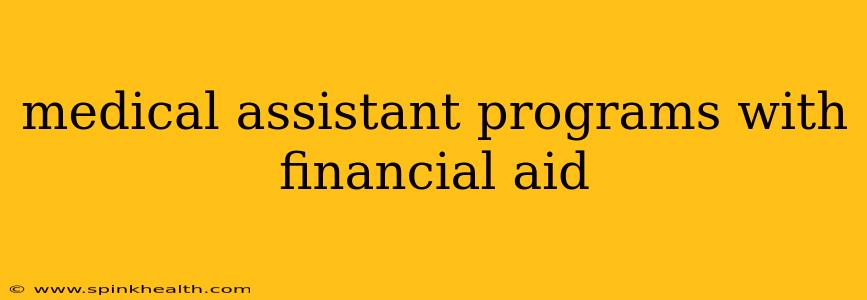Finding Your Path: Navigating Medical Assistant Programs with Financial Aid
The dream of a career in healthcare is within reach, even if the cost of education feels daunting. Many aspiring medical assistants (MAs) find themselves wondering, "How can I afford a medical assistant program?" The good news is that numerous options exist to help finance your education. This isn't just a story about tuition; it's a story about opportunity, hard work, and finding the right path to your future.
My journey into the world of medical assisting started with a similar question. I saw the dedication and compassion of MAs firsthand, and I knew I wanted to be part of that team. But the financial aspect was a significant hurdle. After researching extensively, I discovered a world of financial aid possibilities that made my dream a reality. Let me share my insights and guide you through the process.
What are the different types of financial aid available for medical assistant programs?
This is a crucial question, and the answer is multifaceted. Think of it as a toolbox filled with different instruments, each designed to address specific financial needs.
-
Grants: These are essentially gifts that don't need to be repaid. Many federal and state grants are available to students based on financial need, academic merit, or specific demographics. Think of these as scholarships specifically targeted towards healthcare programs.
-
Scholarships: Similar to grants, scholarships often require an application process. They can be awarded based on academic achievement, community involvement, or even ties to specific healthcare organizations. Researching scholarships relevant to your background and aspirations is vital.
-
Loans: These provide temporary funding that you'll repay after graduation. Federal student loans often come with more favorable interest rates than private loans. Understanding the terms and conditions of each loan is critical to avoiding future financial stress.
-
Work-Study Programs: These programs allow students to work part-time while attending school, earning money to help cover educational costs. This provides valuable work experience alongside your studies, a win-win situation.
-
Employer Assistance Programs: Some healthcare facilities offer tuition reimbursement or assistance programs for their employees pursuing further education, including medical assistant certifications. This is a particularly attractive option for those already working in the healthcare sector.
How can I find medical assistant programs that offer financial aid?
The search for the right program and the right financial support often goes hand-in-hand. Here's a step-by-step guide:
-
Online Research: Start with online search engines. Use keywords like "financial aid for medical assistant programs," "medical assistant scholarships," or "affordable medical assistant schools." Focus your search geographically to find programs near you.
-
Professional Organizations: Many professional organizations within the healthcare field offer scholarships and grants to aspiring medical assistants. Check their websites and explore their resources.
-
School Websites: Visit the websites of community colleges, vocational schools, and technical schools in your area. Look for sections on financial aid, scholarships, and tuition assistance. Many institutions have dedicated financial aid offices ready to help guide you through the application process.
-
FAFSA (Free Application for Federal Student Aid): Completing the FAFSA is crucial for accessing federal student aid, including grants and loans. This form gathers information about your financial situation to determine your eligibility for federal assistance.
What are the eligibility requirements for financial aid for medical assistant programs?
Eligibility criteria vary depending on the type of financial aid and the awarding institution. However, some common factors include:
- Financial need: Many grants and scholarships consider your family's income and assets to determine eligibility.
- Academic achievement: Some scholarships require a minimum GPA or standardized test scores.
- Enrollment status: You must be enrolled (or accepted for enrollment) in a qualifying medical assistant program.
- Citizenship status: Certain programs may have citizenship or residency requirements.
Are there any specific scholarships or grants for medical assistant programs?
Yes, numerous organizations offer scholarships specifically designed for aspiring medical assistants. It's vital to search diligently for scholarships aligning with your background, academic standing, and geographic location. Many smaller, local organizations often offer overlooked scholarship opportunities.
How long does it take to complete a medical assistant program?
Program length varies. Some programs can be completed within a year, while others may take longer. The duration often influences the total cost of the program, so it’s essential to factor this into your financial planning.
Finding the right medical assistant program with the right financial aid package may seem like a complex puzzle, but it's solvable. With diligent research, careful planning, and the support of resources available, your dreams of a career in healthcare are achievable. Remember, this isn't just about the financial aspect; it's about investing in your future and making a difference in the lives of others. Your story is just beginning.

